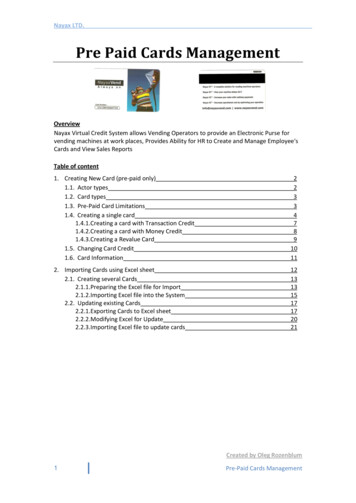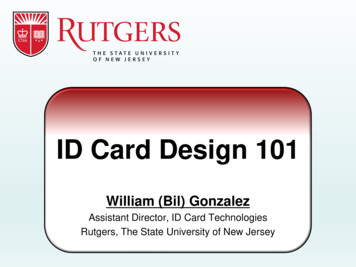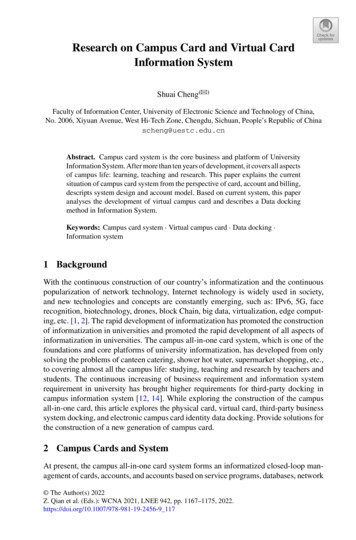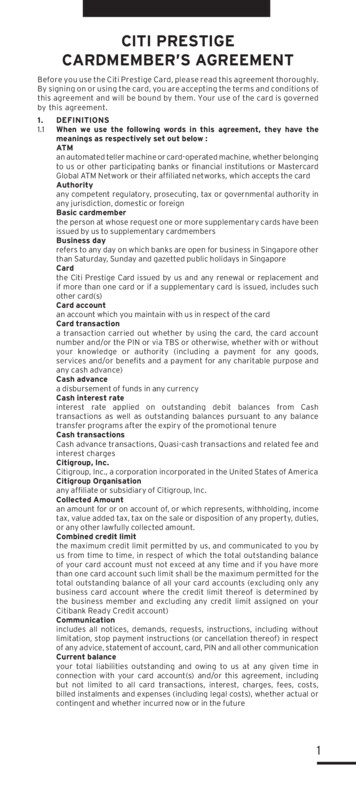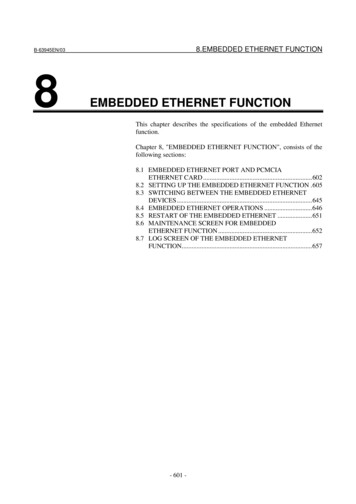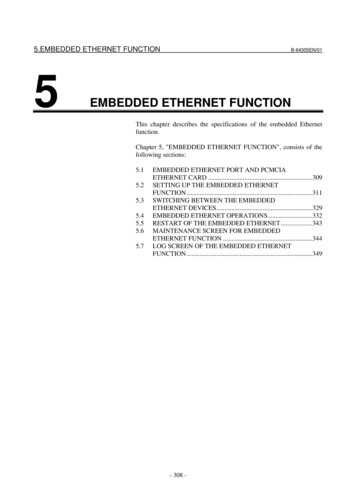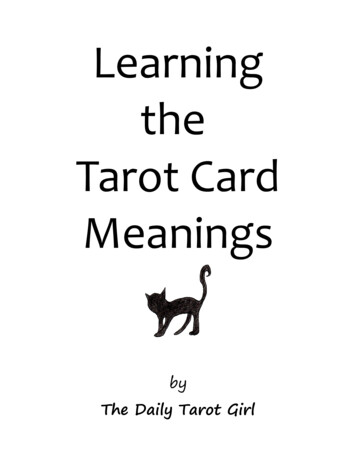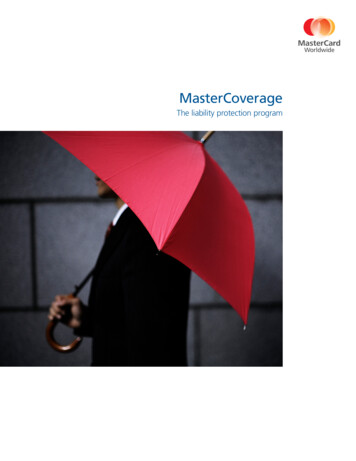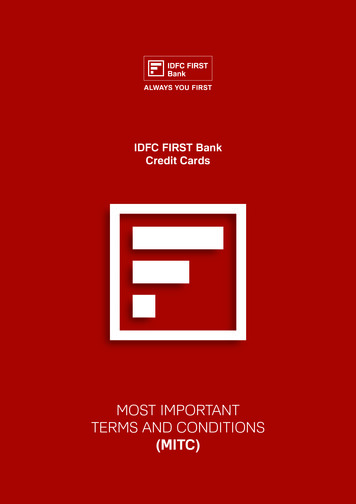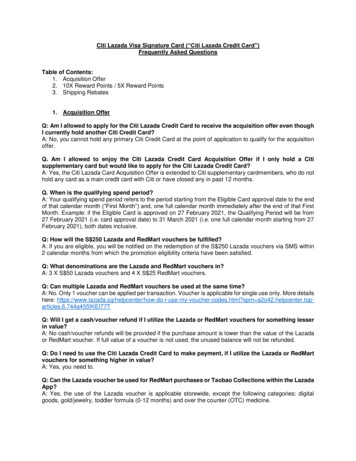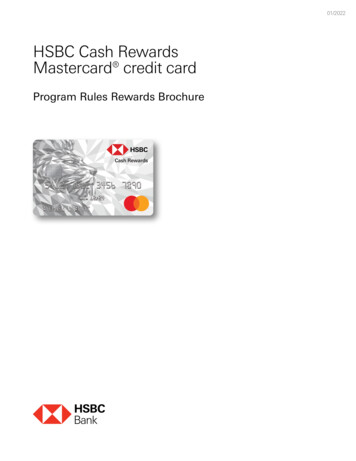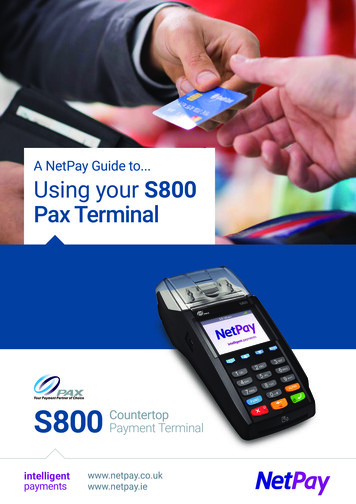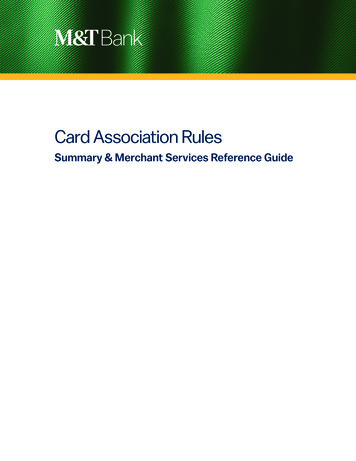
Transcription
Card Association RulesSummary & Merchant Services Reference Guide
Welcome to M&T Bank Merchant Services, your premier provider of debit and credit cardprocessing. Inside this booklet, you will find useful information and helpful tips to make it easier for you to process yourCard Transactions.The Card Associations also provide detailed processing information on their websites to supplement this document.We encourage you to visit the Card Association websites at: MasterCard Resource et-support.html Visa Operating ness/regulations-fees.html Discover www.Discovernetwork.com American Express Merchant Operating Guidewww.americanexpress.com/merchantopguide OptBlue https://optblue.com/If, after reviewing this Guide and/or visiting the Association websites, you are unable to find the answer to yourquestions, please call an M&T Bank Merchant Services Specialist at 1-888-536-7000.This Guide is not a substitute for, or an amendment to, your Merchant Services Agreement with M&T Bank.Defined terms used in this Guide have the meanings used in your Merchant Services Terms and Conditions Agreement.In the event of a discrepancy or conflict between this Guide and your Merchant Services Agreement, the MerchantServices Agreement will prevail.By following the proper procedures outlined in your Merchant Services Agreement, following the Association Rules,and safeguarding against fraud, accepting credit and debit cards can help you grow your business.
TABLE OF CONTENTSCard Transaction Flow. 2Card Acceptance Security. 9Step One: Authorization. 2Signs Of Possible Cardholder Fraud. 9Step Two: Settlement (“Batching Out”). 2Security Features To Review AtReconciling Your Merchant Account. 2The Point-Of-Sale By Card Brand.10Step One: Daily Batch Reconciliation. 2More Signs Of Possible Cardholder Fraud. 16Step Two: Monthly Statement Reconciliation. 3MasterCard , Visa And Discover Interchange (“Interchange”) And American Express Program Pricing (“Program Pricing”). 3Europay, MasterCard, Visa (“EMV”) Chip Cardsand Contactless Payment Cards. 16Retrieval And Dispute Requests.17Retrieval Requests (“12 B Letters”).17Processing Types. 3Dispute Requests.17Processing Card-Present Transactions. 3Minimizing Retrieval and Dispute Exposure.17Qualifying For The Best Card-PresentInterchange Or Program Pricing Rates. 4Cardholder Privacy. 18Processing Card-Not-Present Transactions. 4Payment Card Industry Data SecurityQualifying For The Best Card-Not-PresentStandard (“PCI-DSS”). 19Interchange Or Program Pricing Rates. 4Address Verification Services (“AVS”). 5Commercial Cards.6Returns And Refunds.6Voids.6Card Acceptance Tips.7Prohibited Transactions. 8What Is The PCI-DSS?. 19What Are The Basic Requirements?. 19What Types Of Business Need To ComplyWith The PCI-DSS?. 19What Are The Benefits Of ComplyingWith The PCI-DSS?. 19What Does My Business Need To Do ToComply With The CI-DSS?. 19Important Telephone Numbers.20
CARD TRANSACTION FLOWProcessing a credit card transaction involves twosteps: Authorization and Settlement.STEP ONE: AUTHORIZATIONThe Authorization process allows the Card issuer to approveor decline Transactions. Authorizing Transactions offers youthe best protection against fraud and chargebacks. TypicallyAuthorizations take only seconds to complete.When requesting an authorization, you may receiveone of the following responses:1. “Approved” Definition: The Card issuer will allow the Transaction Action: Continue with the Transaction2. “Decline” or “Card Not Accepted” Definition: The Card issuer will not allow the Transaction. Action: Return the Card to the customer and informthem that their Card issuer has declined the Transaction.Suggest that the customer call the Card issuer on thereverse side of their card for more information. Ask thecustomer for another form of payment3. “Call” or “Call Center” Definition: The Card issuer wants you to call the voiceAuthorization center and provide more informationbefore approving the Transaction Action: Hold the Card and call the voice Authorizationcenter at 1-833-795-6522 Opt 3 for further instructionsor ask for another form of payment4. “Pick Up”: Definition: The Card issuer wants you to keep the Card Action: Retain the Card, if this can be done peacefully5. “Code 10 Authorization” Definition: This is a special request for Authorizationwhen the Cardholder is suspected of trying to performa fraudulent or unauthorized Transaction Action: Call the Voice Authorization Center at1-833-795-6522 Opt 3 and state, “I have a Code 10Authorization request.” Keep the Card in hand whenmaking the call. You may be transferred to a specialoperator. The operator will ask a series of questionsthat can be answered “yes” or “no.” These questionsallow you to verify the authenticity of the Card withoutalarming the Cardholder. If requested by the specialoperator, retain the Card, if this can be doneby peaceful meansSTEP TWO: SETTLEMENT (“BATCHING OUT”)You need to settle each Transaction, in order to receivepayment in your Merchant Deposit Account. To preventinaccuracies, it is important to reconcile your Deviceand Transaction Records PRIOR to settlement. Onceyour Transaction Records are settled, the Transactionsare sent to the Cardholder’s bank to be added to theCardholder’s Card balance or deducted from theCardholder’s deposit account balance. The funds transfertypically occurs within two days. Once the transfer iscomplete, the deposit will post to your Merchant DepositAccount depending on your funding schedule.RECONCILING YOURMERCHANT ACCOUNTReconciling your merchant account involves twosteps: Daily Batch Reconciliation and MonthlyStatement Reconciliation.STEP ONE: DAILY BATCH RECONCILIATIONYou should verify that each batch accepted in everyDevice matches the Transactions accepted at your locationeach day PRIOR to settling the batches. This includes tipadjustments if you are a restaurant or beauty salon. If yourDevice is set to auto-close, it’s important that you reconcileyour receipts with your Device prior to settling. If set onauto-close, ensure you received the auto-close receipt onthe following day. If the batch did not auto settle, it is yourresponsibility to settle the batch according to instructionsprovided for your Device or third-party service provider.If you manually close out your batches, also ensure thatyour receipts match your Device. Be sure to manuallyclose the batch on time based on your funding schedule.2
In all cases, batches submitted later than 24 hours afterthe approval date/time may be subject to additional feesand charges. MasterCard Interchange RatesSTEP TWO: MONTHLY STATEMENTRECONCILIATION Visa Interchange RatesYou should always verify that the batches submitted dailymatch the batches reported on your monthly merchantstatement. If you are missing a deposit or there appears tobe an error in the rates or fees charged on the statement,please contact an M&T Bank Merchant Services Specialistat 1-888-536-7000 to determine next steps. In some cases,you may need to re-enter the batch or research will beperformed based on the issue. You must notify M&T Bankof any errors within thirty days of your statement date. Discover Interchange RatesMASTERCARD , VISA , ANDDISCOVER INTERCHANGE(“Interchange”) ANDAMERICAN EXPRESS PROGRAMPRICING (“Program Pricing”)Card issuers incur costs when processing Card Transactionsfor their customers. This fee is called Interchange forMasterCard, Visa and Discover, and Program Pricing forAmerican Express. Interchange and Program Pricingreimburses Card Issuers for the /acqIntchgLanding.html(Verification Code: disc5379) American Express OptBlue Program Pricing RatesNot available online, contact an M&T Bank Merchant ServicesSpecialist at 1-888-536-7000 for more informationIn addition to Interchange and Program Pricing Rates andFees, there are also “pass-through” charges of various feesdefined by the individual card brands. These are passedonto each merchant account based on card type acceptedon your monthly merchant statement. These pass-throughcharges are typical for every merchant acquirer/processorin the industry. A standard listing of M&T pass-throughfees can be found at: http://www.mtb.com/mstcPROCESSING TYPESPROCESSING CARD-PRESENT TRANSACTIONS The operating cost of posting transactions toCardholder accountsCard-Present Transactions are those that occur whenthere is face-to-face contact with the Cardholder. Thebusiness typically inserts, swipes, or waves (if contactlesspayment) the Card through a point-of-sale device to obtainan Authorization and requires the Cardholder to sign a salesslip. The sales slip is extremely important as it providesevidence of the Transaction. A copy of the sales slip isrequired to be given to the Cardholder and kept on fileby the business a minimum of 36 months (3 years) forfuture reference. And other costsThe sales slip or invoice must contain the following items: The cost of fraud and credit losses on Cardholderaccounts The outstanding credit card balances between thedate of purchase and receipt of Cardholder paymentMasterCard, Visa, Discover Network and AmericanExpress determine the Interchange or Program Pricingrates based on the type of Card used for the Transaction(Consumer, Commercial, International, Rewards, etc.) andhow the Transactions are processed (Card-Present, CardNot-Present, Restaurant, Hotel, etc.). Merchant servicesproviders (also known as acquirers or processors), payissuers a fee for each Transaction processed; it is thelargest component of the fees M&T Bank Merchant Servicescharges your business for processing Card Transactions.For more information on Interchange or Program Pricing, visit: Last 4 Digits of the Card Account Number Card Expiration Date Transaction Date Total Amount of the Sale Business Name City and State (where the Transaction occurred) Cardholder Name Cardholder Signature Authorization numberIf your sales slip does not contain the items outlined above,3
please contact an M&T Bank Merchant Services Specialistat 1-888-536-7000 from 8am to 5pm (ET). City and State (where the Transaction occurred)If you are unable to insert, swipe, or wave (if contactlesspayment) the Card, key-enter the Card account number intoyour Device. Be sure to record the Card account numbermanually and ask the Cardholder to sign a sales slip. Includethe Authorization number on the sales slip. Cardholder SignatureQUALIFYING FOR THE BEST CARD – PRESENTINTERCHANGE OR PROGRAM PRICING RATES Insert, swipe, or wave (if contactless payment) the Card Obtain a signature or PIN number if prompted Request one electronic Authorization per Transaction(all transactions MUST have a valid authorizationcode to avoid penalty fees for no authorization) Ensure the authorized amount is equal to theTransaction amount Settle Transactions no later than 1 day from theAuthorization dateException: Restaurants, taxi cab drivers, and salons may NOT add a tip to theoriginal, Authorized Transaction. There is a 20% variance between the authorizedand settled amounts to compensate for tip adjustments. All other merchanttransactions should be reauthorized for the difference between the authorizedand settled amount if greater than 20%.PROCESSING CARD-NOT-PRESENTTRANSACTIONSCard-Not-Present Transactions are those that occur whenthere is no face-to-face contact with the Cardholder. Thebusiness receives the purchase requests via: mail, telephone,fax, or Internet. The business typically key-enters the Cardaccount number through a Device to obtain an Authorization.An Authorization for a Card–Not-Present Transaction doesnot guarantee the authenticity of a Card or Transaction.A sales slip or invoice is extremely important to provideevidence of the Transaction. If possible, send the Cardholder asales slip or invoice for the Cardholder to sign and return toyou. A copy of the signed sales slip or invoice should be kepton file by the business for future reference.The sales slip or invoice must contain the following items: Last 4 Digits of the Card Account Number Card Expiration Date Transaction Date Total Amount of the Sale Business Name4 Cardholder Name Authorization numberYou may NOT submit a Transaction for payment until youship the merchandise or provide the services ordered. Thispolicy helps protect you from costly disputes by minimizingthe possibility that customers are billed before receiving thegoods or services they ordered. It applies to all Transactionsexcept as noted below. The date the goods are shipped orthe services provided is the Transaction date. Any shippingand handling charges should be included in the totalTransaction amount Authorized.QUALIFYING FOR THE BEST CARD-NOTPRESENT RATES INTERCHANGE ORPROGRAM PRICING RATES Key-enter the Card account number Complete Address Verification Service (“AVS”) andCard Verification Value (“CAV2/CVV/CVV2/CID”) Include customer service telephone number and ordernumber when prompted by your software, gatewayor terminal Request one Authorization per Transaction (alltransactions MUST have a valid authorization codeto avoid penalty fees for no authorization) Ensure the Authorized amount is equal to theTransaction amount Settle Transactions no later than 1 day from theAuthorization dateException: You may complete two sales slips for a single Transaction ONLY ifthere are delayed delivery situations. The first sales slip represents a down payment forthe goods or services and the second sales slip represents the balance due.Card-Not-Present businesses can be held financiallyresponsible for fraudulent transactions, even if the Cardissuer has approved it. This is because there is a greater chanceof fraud due to the absence of the Card and Cardholdersignature. There are security tools available to assist youin detecting and preventing fraudulent activity. The mostcommon tools are Address Verification Services (“AVS”)and Card Verification Value 2 (CAV2/CVV/CVV2/CID). Somesoftware or gateways have fraud filters you can engage/adoptto assist with mitigating fraud. Your third-party vendorshould be able to assist you with activating these features.
ADDRESS VERIFICATION SERVICES (“AVS”)AVS is an automated program that allows a business to verify a US Cardholder’s billing address (and some Canadianand European-issued cards may be eligible for AVS) during the Authorization process. The Card issuer compares theCardholder address (street number and zip/postal code) submitted with the Authorization request to the billingaddress it has on file for the Cardholder. The business then receives a code indicating whether the addresses match.AVS CodeDefinitionExplanationAPartial MatchStreet matches, zip code does not matchVISAIAVS CodeExplanationCInvalidMerchant did not key in AVS infoBStreet matches, zip code does not matchEInvalidAVS data is invalidCStreet matches, zip code does not matchStreet and zip code matchGUnavailableInternational issuer not participating in AVSDNNo MatchStreet and zip code do not matchIAddress information not verifiedRRetryIssuer system unavailable, retry laterMStreet and zip code matchSNot SupportedIssuer does not support AVSPUUnavailableInformation is unavailableStreet not verified (incompatible format),zip code matchesWPartial MatchStreet does not match, zip code matchesXExact MatchStreet and zip code matchYExact MatchStreet and zip code matchZPartial MatchStreet does not match, zip code matchesCaution: When you receive a “No Match” or “Partial Match” AVS response, you should take the appropriate steps to assure yourself that the Cardholder is not acting fraudulently.Please refer to CARD ACCEPTANCE SECURITY on Pages 9-16.CAV2/ CVV2/CVC/CID is a three-digit number imprinted at the end of the Card account number on the signature panel on theback of the Card. This tool was designed to help validate that the customer has a genuine Card in their possession. You canconfirm the CAV2/CVV2/CVC2/CID value with a US Card issuer when you request an Authorization. To protect CVV2 frombeing compromised, NEVER keep or store a card’s code once a transaction has been completed. Such action is prohibitedand it could result in association fines.ExplanationCAV2/CVV/CVV2/CID CodeMExact matchNDoes not matchPCode was not processedSCode was present, but not submittedUCode not verified4 digit CARDVERIFICATIONNUMBERCaution: When you receive anything BUT “Exact Match”, you should take appropriate steps to assure yourself that the Cardholder is not acting fraudulently. Please refer to CARDACCEPTANCE SECURITY on pages 9-16.5
COMMERCIAL CARDSCommercial Cards are issued by MasterCard ,Visa , Discover and American Express . They arealso known as Business Cards, Corporate Cards,and Purchasing Cards.As more and more government agencies and companiesdiscover the benefits of using Commercial Cards, (reducedpaperwork and eliminating the relatively high cost ofpurchasing small dollar items), they are seeking suppliersthat accept these Cards as forms of payment. If youalready accept Cards today, you can accept CommercialCards as well.Typically, companies using Commercial Cards want moreinformation about the Transaction than is available in aconsumer Card Transaction. This information is used bygovernment agencies and businesses to assist them in costallocation, tax compliance, and vendor spending analysis.To meet the needs of the Card users, MasterCard, Visa,and Discover have created three levels of informationbeyond a standard Card Transaction, which can help reduceadditional interchange fees assessed on Commercial CardTransactions. For American Express Purchasing Card Level2 qualification, the Customer Reference Number, Tax Amount,and Shipping Information including Destination Zip Codemust be submitted by the merchant. Only certain Devicesare capable of capturing and transmitting the additionalinformation. For more information, please call an M&T BankMerchant Services Specialist at: 1-888-536-7000 from8am to 5pm (ET).RETURNS AND REFUNDSYou are the expert in your business. You have establishedreturn and refund policies necessary to run your businessefficiently and to best serve your customers’ needs. TheCard Associations require that your return and refundpolicies are clearly disclosed to Cardholders and includedon the sales slip. Disclosures can help you avoid costlymisunderstandings and potential customer disputes.6To ensure your return, exchange, or refund policies areclearly disclosed to Cardholders, you may use any ofthe language suggested below that best representsyour policies. “NO REFUND” “EXCHANGE ONLY” “IN-STORE CREDIT ONLY” “SPECIAL CIRCUMSTANCES”For Card-Not-Present Return Policies, please refer to yourMerchant Services Agreement regarding your obligationsto disclose your policy.If you and the Cardholder agreed to special terms(i.e. late delivery, delivery charges, insurance charges, etc.)or restrictions on returns, you should write the agreed uponterms on the sales slip. The Cardholder’s signature on thesales slip is a good indication that they agreed to thespecial terms.VOIDSFrom time-to-time, you may need to void a transaction.A void can only be performed in a batch that has not beensettled. An example of when a void would be needed is anincorrect transaction amount. Instead of entering 100.00,the clerk enters the transaction as 1,000.00. If the batchhas not been settled, a void can be performed to remove the 1,000.00 entry from the batch. The correct amount canthen be re-entered.Caution: A void will only remove the incorrect transaction from the batch. A void willnot remove the authorization hold from a cardholder account. If you need to releasethe authorization hold, please call an M&T Bank Merchant Services Specialist at:1-888-536-7000 from 8am to 5pm (ET). We will provide you with the card-issuingbank’s telephone number to release the hold. You will need to supply the date of thehold, amount, and your merchant number so have it handy when you call.
CARD ACCEPTANCE TIPS1.Display the appropriate MasterCard, Visa, Discover, andAmerican Express Card decals to let Cardholders knowthat you accept these types of Transactions. Businessesare required to do so.2. Ensure that your point-of-sale staff is informed of theproper procedures and review this Guide periodically.3. Ensure your customer receipts are masked (only showlast 4 digits) and that the expiration date of the card is notprinting on customer receipts.4. Request an Authorization for EVERY Card Transaction.If you fail to get a valid authorization code, you may beassessed a penalty fee by the card associations.5. Use the AVS and CAV2/CVV/CVV2/CID for EVERYCard-Not-Present Transaction.6. Submit AVS and CAV2/CVV/CVV2/CID and AVS forrecurring billing or installment purchases.7.Insert, swipe, or obtain a manual imprint whenever theCard is present. If the card cannot be inserted or swiped,manually key enter the Card account number.8. For those transactions not authorized by a PIN entry,collect a Cardholder signature and compare it tothe signature on the back of the card for EVERYCard-Present Transaction.9. Retain original or legible copies of sales slips for atleast three years.10. Identify suspicious behavior and take the necessaryprecautions, such as ordering a “Code 10” Authorization.Please see Code 10 on page 3.11. Do not enter the same Transaction more than once.Know the proper procedures for canceling or voidingTransactions.12. Do not ship merchandise to an address other than theCardholder’s billing address. If a Card-Not-Present orInternet Transaction, request a delivery signature or otheridentification if you are not shipping to the same billingaddress. This practice may not protect you from certaintypes of chargebacks for authorized purchases evenwith a valid AVS response. It is your responsibility to knowyour customer.13. As of the time of this publication, your business mayset a minimum Transaction amount to accept a creditCard, as long as the minimum Transaction amount doesnot exceed 10 (or any higher amount established bythe Federal Reserve Board by regulation) and does notdifferentiate between Card issuers or between Cardnetworks. Your business may impose a maximum on creditcard transactions if you are a federal agency or institutionof higher education. Your business may not impose aminimum or maximum on a debit or prepaid Card.14. As of January 2013, MasterCard, Visa, Discover andAmerican Express began allowing surcharges on certaincredit and Commercial Card Transactions. For moreinformation on whether you may assess a surcharge: MasterCard ort/merchant-surchargerules.html Visa tions-fees.html#2 Discover https://www.discoversurcharge.com/ American Express -agrees-to-settle-classaction.aspx15. Regardless of whether the Card Associations permitsurcharging, some states have laws that prohibitsurcharging. Before assessing a surcharge on anyTransaction, be sure to check whether the state inwhich you do business permits surcharging.16. Collection of Service Fees or Convenience Fees isallowable with certain restrictions. Please call anM&T Bank Merchant Services Specialist at:1-888-536-7000 to determine if your business type iseligible; or you may review qualification criteria on thecard association websites.17. Do not process the prohibited transactions as outlinedin Prohibited Transactions section. Doing so may result intermination, requirement of a reserve account or fundingholds in accordance with your Merchant Agreement.18. If you do not feel comfortable accepting the Transaction,you can ask for another form of payment.7
PROHIBITED TRANSACTIONSYOU ARE PROHIBITED FROM ENGAGING:A prohibited Transaction is one that is not in compliancewith the Rules. Businesses that accept Cards should beaware of the types of Transactions that are prohibited andthe penalties that can be imposed if a prohibited Transactionis completed. Below are some of the more commonprohibited Transactions. For a complete list please visitthe Association websites.In factoring (laundering) or depositing sales slips from otherbusinesses, which you may own or purchase, but are notexplicitly listed in your current Merchant Services Applicationon file with us. Be wary of the “fellow business person”who offers to pay you a fee or commission to deposit theirMasterCard, Visa, Discover Network or American Expresssales slips in your account or third-party intermediarieswho offer payment plans to cardholders for merchandiseor services purchased at your place business. Ask yourself,“Why can’t this business or business person get anagreement on their own?” These transactions are oftenquestionable or even fraudulent.Note: If deposited, sale slips involving prohibited Transactions will be subject tochargeback and may lead to termination of your Merchant Services Agreement.YOU ARE PROHIBITED FROM PROCESSING(FOR A COMPLETE LIST VISIT EACHASSOCIATION WEBSITE): Cash advances to your business, yourself or youremployees Transactions to cover previously incurred debts, such asbounced checks or payment for returned merchandisenot purchased with a Card Pre-authorized Transactions for goods or services afteryou receive notice of cancellation by the Cardholder Transactions declined by the Authorization Center Transactions using a Card with an invalid effective dateor expired date Transactions where the signature on the Card and thesales slip are not the same Transactions that separate taxes from the purchaseamount Knowingly making cash refunds to Cardholders for anyreturned merchandise or canceled service originallypurchased with a Card. Your sales staff should completea credit slip for adjustments Taxes paid separately via cash. Include taxes in theoriginal Transaction amount8ADDITIONALLY, YOU ARE PROHIBITED FROMTHE FOLLOWING: Minimum transaction dollar amounts on debit cardTransactions, as a condition for honoring a Card.Cardholders are permitted to use their debit Cardsfor any dollar amount Maximum transaction dollar amounts, as a conditionfor honoring a Card Resubmitting a Sale on a previously charged backTransaction Sales deposited at another financial institution beforeor after you deposit it with M&T Bank Transactions into multiple Transactions to avoidAuthorization requirements
CARD ACCEPTANCE SECURITYYou should be aware of the basic elements and securityfeatures of MasterCard , Visa , Discover and AmericanExpress Cards. These elements and features can helpyour staff avoid inadvertently accepting a counterfeitCard or processing a fraudulent transaction. Considerthe following:SIGNS OF POSSIBLE CARDHOLDER FRAUD: First time shopper Larger than normal orders Orders consisting of several of the same item Orders made up of “big” ticket items Orders shipped “rush” or “overnight” Orders shipped to an international address Transactions with similar account numbers Shipping to a single address when Transactionstake place on multiple Cards Multiple transactions on one Card over a shortperiod of timeBe alert for Transactions with several of these characteristics.Keep in mind that a Transaction with one of thesecharacteristics does not mean you are being scammed,but a few or several of them together might. Remember,never ship an order unless you receive a valid Authorization.In addition, taking the time to look at the Card is critical.Encourage your sales staff to STOP at the beginning of theTransaction, LOOK at the Card, and LISTEN for any warningsignals from the Cardholder that might indicate a suspiciousTransaction. Do not be hesitant to ask for a different formof payment or call for a Code 10 Authorization.9
SECURITY FEATURES TO REVIEW AT THEPOINT-OF-SALE BY CARD BRANDThe basic elements and security features of MasterCard, Visa, Discover and American Express Cards are as follows:Use these tips for verifying Traditional MasterCard Cards:MasterCard Card Security Features and Optional Card Features1. The first 4 digits of the account number must match the 4digit preprinted BIN. Remember, all MasterCard accountnumbers sta
DISCOVER INTERCHANGE ("Interchange") AND AMERICAN EXPRESS PROGRAM PRICING ("Program Pricing") Card issuers incur costs when processing Card Transactions for their customers. This fee is called Interchange for MasterCard, Visa and Discover, and Program Pricing for American Express. Interchange and Program Pricing
